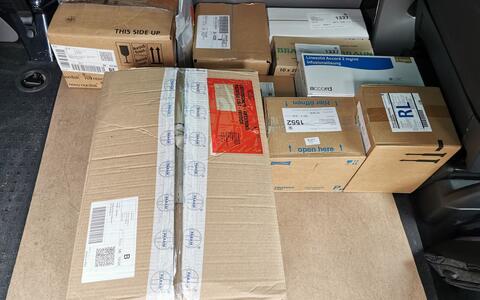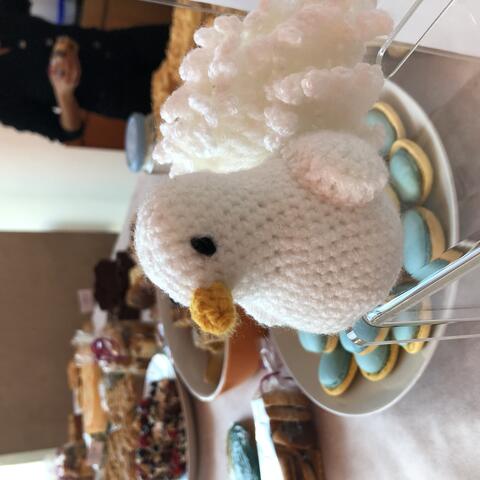Aid for Ukraine
Colleagues are donating money for medicines, working groups are offering jobs for Ukrainian researchers, and the student lab is opening its doors to children from Ukraine. The war in Ukraine has inspired great solidarity at the MDC. Overview.
Feraye Kocaoglu is feeling overwhelmed. She hadn't expected so much money and such great willingness to help. Kocaoglu, an assistant to several MDC research groups, is currently organising support actions for Ukrainian refugees. Together with Joanna Kaldrack from the Research Funding department, and at the request of management and the crisis committee of the Max Delbrück Center for Molecular Medicine in the Helmholtz Association (MDC), she is coordinating the centre’s activities. The team can be contacted at ukraine@mdc-berlin.de. To quickly collect donations for medicines, only a few days after the Russian invasion Feraye Kocaoglu organised a bake sale at Campus Buch and at the Berlin Institute for Medical Systems Biology, part of the MDC.
Money for prescription medicines
“Many employees baked cakes and gave donations. Rather than set prices, people could pay whatever they wanted for a slice of cake. The action raised a staggering 3,223 euros”, says Feraye Kocaoglu. MDC researchers with a licence to practise medicine are using these funds to procure prescription medicines. The drugs are being transported to Ukraine and distributed locally by the Initiative für Wissensaustausch, Empowerment und Kultur (IWEK). In view of this tremendous success, the two women are now planning a sale of international finger food.
© Feraye Kocaoglu, MDC
Material donations – toiletries, over-the-counter medicinal products such as painkillers or bandages and non-perishable foods – are being collected at the MDC, with strong support from technical assistant Margareta Herzog. Coordinated by the postdoctoral researcher Oleksandra Kalnytska, Ukrainian volunteers are collecting these donations regularly and transporting them to the border. MDC employees can find further information on a Ukraine aid website on the intranet, including useful options for personal donations. Specific calls for assistance are also posted here, for example a request for furniture donations for a refugee family.
Dr Luiza Bengtsson from the MDC communications team is an expert in knowledge transfer and works closely with the student lab at Campus Buch. Together with colleagues from the Life Science Learning Lab, she is now organising a course for refugee children from Ukraine. “The response to my email survey at the MDC was enormous. It's great to see how many people want to help,” she says. Two dates have already been scheduled: On 13 and 20 April 2022, children from six to twelve years of age are invited to take part in “research holidays” at Campus Buch, which will include activities such as experiments, play and handcrafts.
Offers for Ukrainian researchers
Dr Joanna Kaldrack and Dr Oksana Seumenicht are looking after funding opportunities for Ukrainian researchers. Because as well as providing rapid humanitarian assistance, the aim is also to help refugee researchers quickly get back to work. The MDC is represented on solidarity lists of various scientific organisations and initiatives. “We advertise ourself as a partner institution for Ukrainian researchers on these lists, for activities such as joint applications for funding,” explains Joanna Kaldrack. Researchers can contact the MDC through the solidarity lists of the European Molecular Biology Organization (EMBO), EU-LIFE, the Bündnis der biowissenschaftlicher Spitzenforschungsinstitute Europas or the Initiative Science for Ukraine. Different MDC working groups have registered with their scientific focus.
© Feraye Kocaoglu, MDC
Joanna Kaldrack is available to advise interested parties on work opportunities at the MDC. A matching programme is also in the pipeline to connect MDC group leaders with Ukrainian researchers. “It is still unclear how the administrative aspects of these positions will be managed and funded, and the MDC cannot yet offer any specific jobs,” explains Joanna Kaldrack. The refugee initiative of the Helmholtz Association Initiative and Networking Fund is looking after refugees from Ukraine seeking a position in administration or technical assistance. Joanna Kaldrack is helping with applications in this area, too.
Many MDC employees are also getting involved on a personal level. For example, the molecular biologist Dr Emanuel Wyler. He has assisted at Berlin Central Station on several occasions, including providing Ukrainian families with information on Covid: “We have developed an information sheet at the MDC explaining the disease and measures such as 3G in easily understandable terms. Two colleagues have now translated this into Ukrainian and Russian,” explains the researcher. Plans are also in place to distribute the information to major accommodation providers in Berlin that will soon receive people from Ukraine.
Text: Wiebke Peters
Ukrainian aid at the MDC can be contacted centrally at ukraine@mdc-berlin.de. Refugees from Ukraine are welcome to get in touch.
Further Information
- Ukraine aid on the MDC intranet
- Statement by the MDC: Solidarity with Ukraine
- On the open letter of Russian scientists – Statement by the founding coordinators of BR50
- EU-LIFE: Standing in solidarity with Ukraine
- EMBO solidarity list






